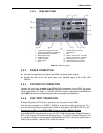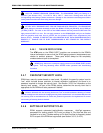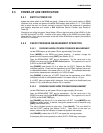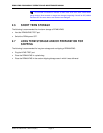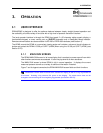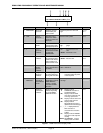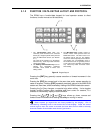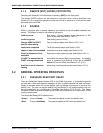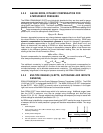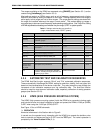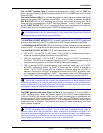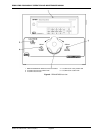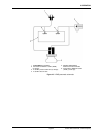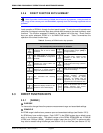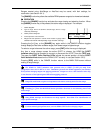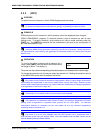
3. OPERATION
Page 19 © 2007 DH Instruments, a Fluke Company
3.2.2 GAUGE MODE, DYNAMIC COMPENSATION FOR
ATMOSPHERIC PRESSURE
The RPM4 A70M/A20M-AF Q-RPTs are intrinsically absolute but they are also used for gauge
measurement mode (see Section 3.3.3, PRINCIPLE). Gauge measurement mode is achieved by
subtracting the value of atmospheric pressure, P
offset,G
, from the Q-RPT’s absolute reading
using AutoZ (see Section 3.2.2). The AutoZ routine that measures P
offset,G
, is run by pressing
[AutoZ] whenever RPM4 is in the vented condition. This assures the continuous updating of the
P
offset,G
value corresponding to atmospheric pressure. Gauge pressure is the measured absolute
pressure, P
u
, minus the atmospheric offset, P
offset,G
.
P
gauge
= P
u
- P
offset,G
However, atmospheric pressure may change between opportunities to run AutoZ and update
the value of P
offset,G
, for example when running an extended test without venting. RPM4 uses
dynamic compensation for atmospheric pressure to correct for changes in atmospheric
pressure between opportunities to run AutoZ and update P
offset,G
. When AutoZ runs, and
P
offset,G
is determined, the reading of RPM4’s on board barometer, P
atm,0
, is also recorded.
Later, when no longer vented, the change in atmospheric pressure, ΔP
atm
, since P
offset,G
was
updated, is the difference between the current barometer reading, P
atm
, and the barometer
reading at the time of AutoZ execution, P
atm,0
:
ΔP
atm
= P
atm
- P
atm,0
Dynamic compensation for atmospheric pressure uses ΔP
atm
to correct the value of P
offset,G
,
thus always compensating real time for changes in atmospheric pressure:
P
gauge
= P
u
- P
offset,G
- ΔP
atm
The additional uncertainty in gauge pressure mode due to the dynamic compensation for
atmospheric pressure technique is a function of the resolution and short term stability of the
on-board barometer, not its absolute measurement uncertainty. This additional uncertainty is
completely insignificant in the range of pressure covered by the RPM4 A70M/A20M-AF.
3.2.3 MULTIPE RANGES (Q-RPTS, AUTORANGE AND INFINITE
RANGING)
RPM4 A70M/A20M-AF has two Quartz Reference Pressure Transducers (Q-RPTs). The A70M
(10 000 psi) Q-RPT is designated the Hi Q-RTP. The A20M (3 000 psi) Q-RPT is designated
the Lo Q-RTP. Which Q-RPT is currently active is continuously by characters in the upper
right hand corner of the MAIN RUN screen and most other screens.
Each RPM4 Q-RPT has a default range which is its maximum range. Additional ranges, lower
than the Q-RPT’s maximum, may also be created using AutoRange and AutoTest (see
Section 3.3.4, 3.3.10). Ranges created using AutoRange are temporary but may be saved with
all their settings for reactivation (see Section 3.4.1.1).
An RPM4 range is identified by a range screen showing the Q-RPT used by the range, its current unit
of measure and its full scale pressure in gauge and absolute measurement modes. The range
screen is:
1. Q-RPT designator.
2. Type of range. DF for the Q-RPT’s default range; AR for a range
created by AutoRange.
3. Q-RPT position designator.
4. Current pressure unit of measure.
5. Full scale pressure in current unit of measure in gauge (<g>) and/or
absolute (<a>) measurement mode.
Active A70M DF Hi
psi 10000g/10000a



